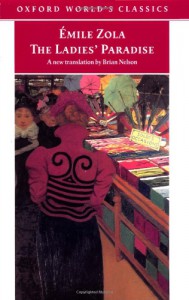Nicole~
The Ladies' Paradise by Émile Zola

I imagine a bewildered Emile Zola wandering into the crowds populating that new phenomenon that took Paris merchandising in the 19th century by storm - mass production and the birth of the superstore. He enters through the widely opened arms of polished French doors, having to blink tearily at the brilliantly lit chandeliers. Immediately, he is choked by perfumed mists diffusing the air and is submerged in whispers of fine French lace and ribbons, rows of rainbowed textures and fabrics on display, corsets and lingerie accosting his libido. He raises his gaze to the vaulted ceiling and catches the shrewd eye of Octave Mouret, hovering watchfully at the balcony of the second floor and nods a gentlemanly greeting. With this brief upward glance, Zola becomes distracted, shuttled through the cogs of this enormous commercial machine, through its undulating channels, eventually misplacing his wife in the melée - the latter having spied a lady friend in the direction of the fine dresses salon, where time becomes lost and space is infinite.
This is The Ladies' Paradise: the department store where all the whimsies of a woman are catered to in one majestic place; where romance, excitement and fantasy materialize through the latest in fashionable outerwear and underwear, notions, potions, novelties, household goods and other en vogue excesses not wholly necessary for ordinary life, are sold. (Ok, it's Macy's on steroids on 'discount day'!).
Eleventh in Les Rougon-Macquart cycle, the novel is about modern consumerism and utopian fantasy, a 19th century rags- to-riches story. Denise Baudu is a humble and impoverished shopgirl who finds work in the flourishing department store, The Ladies' Paradise, trying to make ends meet to support her two brothers, but colliding with the worst of human flaws. The novel chronicles the struggle between the traditional shop, the Old Elbeuf (the declining establishment owned by Denise's uncle), and the monster department store owned by the innovative Octave Mouret. A habitual seducer of women, Mouret's own insatiable passion is to conquer the 'woman', to hold her at his mercy, to intoxicate her with unwavering attentiveness and manipulate her desires within his establishment. The art of the seduction is not in the boudoir but in the caresses of silk and lace finery found at the most efficient of merchandising mechanisms, with the unique ability to offer national brands at substantial reductions.
Zola is a mesmerist when describing the scene of the crowd which takes on a protagonist role of its own. He details economic reinvention and capitalism fueled by consumers' neurotic impulses to shop, the system of mass production and the consequences its development had in revolutionizing the retail industry, in a story decked out in illusion, seduction, luxury, romance, class division, obsession and greed.
Any criticism I might offer would be Zola's neglect in providing reasons for Denise's rise in the department - what merited such promotions? In the BBC series, a very sketchy interpretation of the novel by the way, Denise is shown as an astute, bright and quick thinking sales girl whose original ideas won her elevation in the store. In the novel, however, Denise remains a mousy innocent, extremely mindful of her virtue, afraid of her own shadow, promoted not by any skill of her own, it appears, but by Mouret's regret that her reputation was often tarnished by her peers; secondly, by his own desire to conquer her, which eventually, more deeply turns to love.
The Ladies' Paradise is one of Zola's lighter novels in Les Rougon-Macquart series, yet gives some pause for reflection, to take stock of one's wants, needs and their intrinsic values: truthfully speaking, what price is a lady's satisfaction?
 2
2
 1
1



